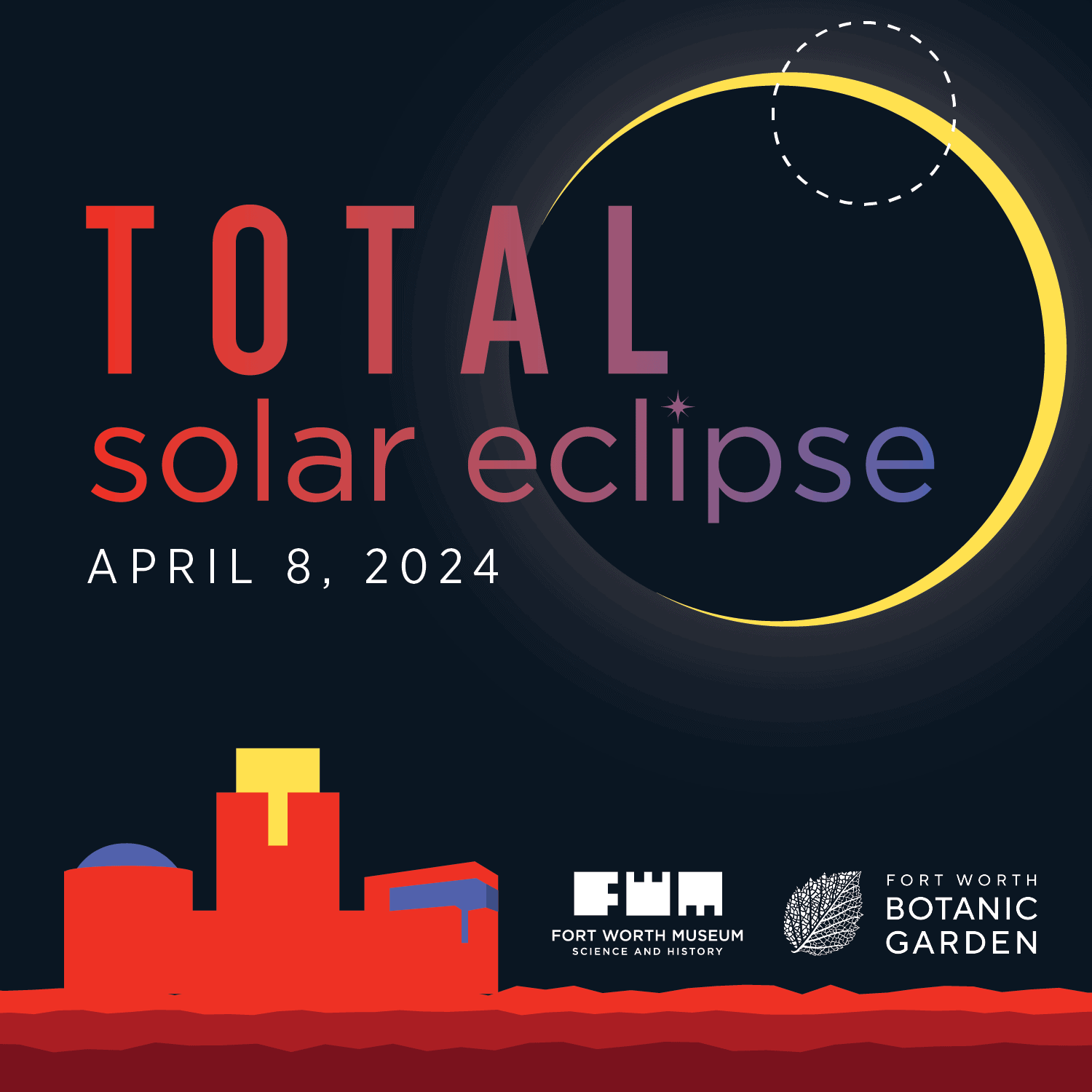TOTAL SOLAR ECLIPSE

April 8, 2024 | 10 AM - 3 PM
Time of Totality: 1:41 PM
Celebrate the total solar eclipse with the Fort Worth Museum of Science and History and the Fort Worth Botanic Garden on April 8, 2024! Join us from 10 AM - 3 PM for eclipse activities and space science, free with general admission. Free admission and glasses are offered with Museum membership. Solar eclipse glasses are now available for $3 in ShopToo! and will be available for purchase during the event.
Please note: a free viewing area will be available outside of the Museum.
In April, Fort Worth will be in the path of totality. Totality is the point of the eclipse where the Moon fully covers the Sun. When this happens, not only will we see an ominous black shadow in the sky where our Sun used to reside, but also something truly rare to the human eye: the Sun’s corona, the outer atmosphere of our star. Be sure to savor this moment to the fullest because our totality will only last for about two and a half minutes before the blazing Texas Sun makes its reappearance.
What to Expect:
- Prime eclipse viewing: Join us on the Museum's front lawn for a unobstructed view of this amazing eclipse!
- Safe and informed experience: Solar eclipse glasses will be available for purchase for $3 in addition to the general admission price. There will be a free viewing area outside of the Museum where guests can purchase solar eclipse glasses.
- Family-friendly fun: From community science with members of our education team to musical performances from the Navy Band Southeast Brass Quintet, expect plenty of engaging activities as we await the solar eclipse.
- Sips + Bites: Enjoy the wonderful taste of Chick-fil-A in the Stars Café or head outside to grab a bite from local food trucks such as Dough Boy Donuts, Heim Barbecue, or Travelin’ Tom’s Coffee.
Looking for even more solar eclipse fun? Head to the Fort Worth Botanic Garden for additional activities! Museum and FWBG members receive reciprocal free admission for this event.
Want a simple and convenient way to get to the Museum? Save 50% off a Trinity Metro Local Day Pass when purchased in the GoPass mobile ticketing app.
Adult: TMECLA
Reduced*: TMECLR
*Available (with valid ID) for seniors 65+, persons with disabilities, Medicare card holders, youth ages 5-19 and veterans with proof of status. No ticket needed for children ages 4 and under. Promo codes can be used up to 4 times by an account holder, so multiples in a family may enjoy the savings.
Learn About the Solar Eclipse
A solar eclipse occurs when the Moon crosses directly between the Earth and the Sun, blocking some or all of the Sun’s light. Although you may not have seen many solar eclipses in the past, they are anything but rare. Solar eclipses happen on Earth two to five times a year, and total solar eclipses happen on average every 18 months. So, if total solar eclipses are not so rare, why has Fort Worth not seen one since July 29th, 1878? This is because total solar eclipses only recur in one given place within the span of 360 to 410 years. Fort Worth just happens to be in the intersecting paths of its previous and next total solar eclipses!
A solar eclipse is truly a once-in-a-lifetime event. Everyone will be staring up in the sky at the same object. Unfortunately, this object is our Sun, and staring at it with our naked eye, even just for a little bit, can cause significant damage to our retinas. These same rules apply for a solar eclipse. Except for the period of totality, it is NEVER safe to look at an eclipse with the naked eye.
However, there are safe and effective ways to view the Sun and its eclipse. Paper solar eclipse glasses and solar filters are great ways to observe an eclipse safely. You can also build your own pinhole Sun viewer with just a cardboard box, aluminum foil, and a sheet of white paper. Even a simple household colander can be used to project many tiny crescent Suns onto a surface. Another technique is to use both hands to cross your fingers over each other (like a waffle), and you will see eclipse shaped shadows on the ground. You can also see this effect under trees that have many overlapping leaves.
Need more eclipse info? Explore the solar eclipse with our Solar Eclipse educator guide, created for teachers and educators to learn more about the science of an eclipse, proper eclipse safety, what happens before and after, and instructions on how to build your own eclipse pin-hole viewer.
For more information on the solar eclipses, you can visit https://solarsystem.nasa.gov/eclipses. Don't forget to check out the Burke Baker Planetarium’s Totality Over Texas now showing at the Noble Planetarium!
Total Solar Eclipse at the Museum is supported by the Association of Science and Technology Centers.
This work is supported by the Simons Foundation and is part of its ‘In the Path of Totality’ initiative.
![]()
The Fort Worth Museum of Science and History is grateful to Higginbotham for their support in memory of Carl Brumley.![]()
The Fort Worth Museum of Science and History is an official NSTA/SSI Solar Eclipse Partner.

